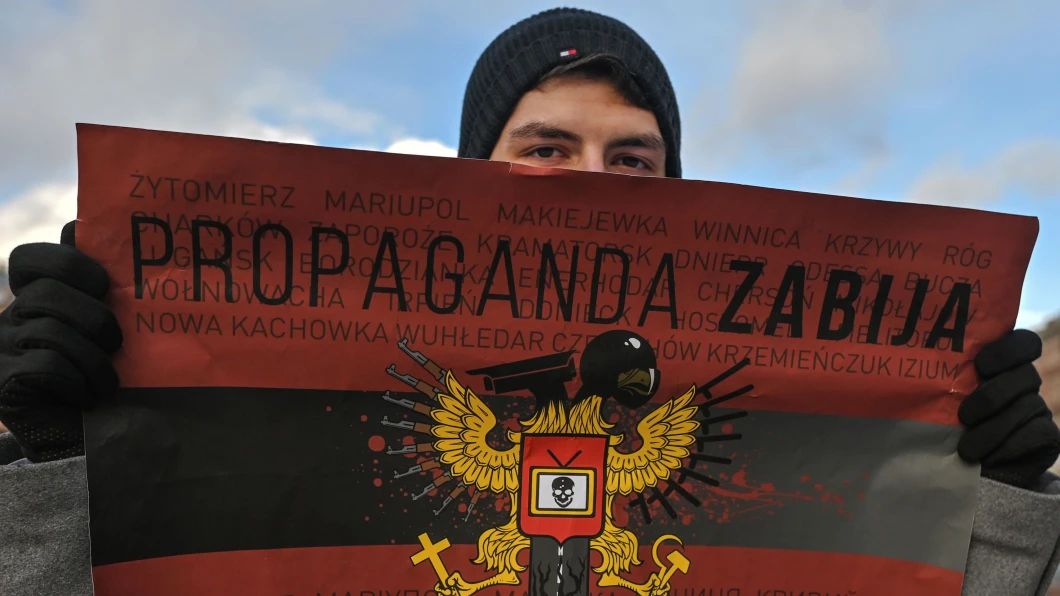Date: 20 October 2023 Author: Hanna Okurowska
Russian Disinformation on Grain Crisis in Europe
Representatives of Poland, Slovakia, Romania, and Hungary have met on Tuesday, September 5th in Brussels to discuss the matter of expiring, with September 15th, ban on Ukrainian grain import. Members of European Union still cannot reach a consensus regarding the grain issue, that is going to satisfy not only everyone in Europe, but also in Ukraine and the developing parts of the world.

The roots of the issue can be found with the beginning of a full-scale Russian invasion, when Russian troops have blocked the access to Black Sea ports from which Ukraine have exported its grains up until February 24th, 2022.
Prior to the war, 75% of Ukrainian exports had been conducted through ports on Black and Azov Sea. The vast majority of grain was exported to countries in Northern Africa and Asia, however with the beginning of Russian invasion and Russian troops blockage of ports on Black Sea, Ukraine was faced with the threat of grain, food and market crisis. As panic came over Ukrainian farmers, European Union showed helping hand and in June 2022 took down custom duties and import quotas on Ukrainian agricultural products showing solidarity and helping the situation of destabilized Ukrainian Agra market.
Even though the idea to support Ukrainian farmers was, and still maintains good, it shouldn’t come as a big surprise that farmers from border, also known as frontline countries, started soon protesting that Ukrainian grain flooding European markets will result in a rapid plunge of prices of their own grain. It should be noted that prior 2022 countries like Romania, Poland or Hungary have imported trace amounts of Ukrainian grain. In the case of the former, cereal import from Ukraine has increased over 630 times between 2021 and 2022.
The solution to the issue became a Black Sea Grain Initiative, developed in July 2022 between Russia, Ukraine, Turkey, and United Nations. The agreement allowed for Ukrainian export ships to safely exit ports on Black Sea, however after a year, in July 2023 Russia has backed off from the deal causing new disarray in the Ukrainian, European and world food market.
To prevent further protests from European farmers, European Commission introduced a ban on import of Ukrainian wheat, maize, rape, and sunflower seeds to the five most affected countries; (Poland, Romania, Bulgaria, Slovakia, and Hungary) with effect until September 15th. Said countries were only to assist with the transit. The idea was simple- with help of European transportation means Ukrainian grain can reach developing countries, without need for using blocked ports on Black Sea. Ukrainian farmers can sell their grain, while Eastern European farmers don’t face competition from much cheaper Ukrainian cereal.
Although the idea sounds easy, not everyone is in support. After five frontline countries started advocating for an extension of import ban until at least the end of the year, Volodymyr Zelensky called that “unacceptable”, saying that it contradicts the idea of European-Ukrainian solidarity. Moreover, the remaining 22 EU member states also oppose the extension of the ban, some calling it a “purely political decision” and seeking different ways of helping both Ukraine and Eastern European states.
The discussion has no visible end with Polish Agriculture Minister- Robert Telus now arguing that the ban has actually resulted in more grain being transited to developing countries, which should be perceived as a good outcome. He also stated firmly that Poland is ready and willing to maintain its help with the transit, however that the country will not agree to import of Ukrainian cereal and that the ban should be extended to raspberries as well.
As one can imagine, the whole situation is a perfect fodder for Russian propaganda. Headlines like “Having such an ally as Poland, Ukraine does not need enemies”, could’ve been seen in Russian newspaper- Ria Novosti while narratives suggesting that United States and European Union expand their wealth by conflict in Ukraine are ever-present since the beginning of the war.
Another Russian disinformation campaign is targeted at developing countries importing agricultural products from Ukraine and Russia. The aim of this one being, accusing United States of creating a world food crisis that the West has allegedly strived for.
Lastly, Kremlin has also lost no time in spreading disinformation within European countries, especially those of Visegrad Group. In Poland for instance, news of companies buying cheaper Ukrainian grain and selling it for profit on Polish market, or different percentages of how much of Ukrainian grain have leaked into Polish market have flooded the internet. That in companion with all the information about the bad quality of Ukrainian grain has caused panic not only within farmer’s circles but also unrelated to agricultural market citizens.
While it is unsure whether a current grain issue was a hybrid warfare on Putin’s side, or just a sequence of events with no obvious or easy solution, truth be told, in the short run it did stir up the international relations and undermined Western approach to the war. However, it did not cause a food world crisis, nor break the Western-Ukrainian understanding and solidarity. For now, what’s left is wisely distinguish facts from Russian propaganda and hope for European Commission to undertake the best possible solution to keep both Europe and Ukraine happy, while Kremlin far from satisfaction.
Bibliography:
1. https://www.statista.com/chart/29749/cereal-exports-from-ukraine-to-its-neighbors/
2. Orłowska-Chyż N., 2022, Inwazja rosyjska a kryzys żywnościowy na Ukrainie i świecie, Ośrodek Studiów Przestrzeni Postsowieckiej Centrum Badań nad Bezpieczeństwem Akademia Sztuki Wojennej
3. Ministry of Economy of Ukraine, 2022, European Union has officially abolished tariffs on Ukrainian goods, Government Portal DOI: https://www.kmu.gov.ua/en/news/yevropejskij-soyuz-oficijno-skasuvav-mita-na-ukrayinski-tovari
4. Harper J., 2023, Food security: Polish farmers hurt by Ukraine grain imports, Deutsche Welle DOI: https://www.dw.com/en/poland-ukraine-grain-imports/a-66424707
5. Kijewski L, Brzeziński B, & Moens B, 2023, Most EU countries oppose Polish-led calls to keep Ukraine grain curbs, Politico DOI: https://www.politico.eu/article/eu-countries-oppose-poland-call-ukraine-grain-curb-elections/
6. Ministry of Agriculture and Rural Development Republic of Poland, 2023, Ban on Ukrainian grain imports – the position of the ‘five’ frontline countries DOI: https://www.gov.pl/web/agriculture/ban-on-ukrainian-grain-imports–the-position-of-the-five-frontline-countries
7. Editorial Team, 2022, Russian Disinformation Targets Polish Business, Visegrad Insight DOI: https://visegradinsight.eu/russian-disinformation-poland-business-ukraine-war/
8. https://www.politico.eu/article/eu-ukraine-russia-black-sea-grain-deal-food-security-war/
The project is co-financed by the Governments of Czechia, Hungary, Poland and Slovakia through Visegrad Grants from International Visegrad Fund. The mission of the fund is to advance ideas for sustainable regional cooperation in Central Europe.

Support Us
If content prepared by Warsaw Institute team is useful for you, please support our actions. Donations from private persons are necessary for the continuation of our mission.
All texts published by the Warsaw Institute Foundation may be disseminated on the condition that their origin is credited. Images may not be used without permission.
















